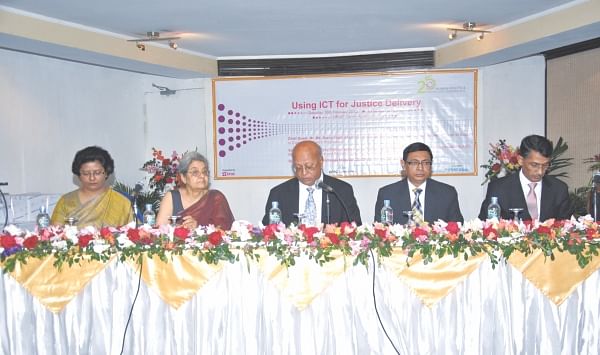| Home - Back Issues - The Team - Contact Us |
 |
| Volume 11 |Issue 08| February 24, 2012 | |
|
|
Human Rights ICT for Justice Sharmin Ahmed
Abdur Rashid, a farmer of Rangpur notices that his friend Kashem Miyah is facing land dispute issues with a powerful and corrupt member of the village leaders. Kashem Miyah, who is illiterate and poor does not even know who to go to for advice, forget seeking legal help. Abdur Rashid, who is in possession of a mobile phone and is aware of the Human Rights and Legal Aid Services (HRLS) programme of BRAC, sends an SMS with a brief description of the crisis to one of the 530 Legal Aid Clinics of BRAC's HRLS programme which is spread country wide. These clinics are a one stop solution for the poor and marginalised community members to receive legal counsel and gain access to Alternative Dispute Resolution (ADR), legal coordination and support networks. At the clinic there are 'bare-foot lawyers' as they are called, and Odhikar Sheboks/Shebikas who are trained by BRAC to address and provide advice on various legal issues. There are as many as twelve thousand such barefoot lawyers all over the country bringing legal aid to every door step of the marginalised masses whenever they are in need. With Abdur Rashid's SMS as a source, a barefoot lawyer is sent to examine the situation. He then returns to the clinic, confirms the issue and records it, and thus begins the process of helping Kashem Miyah. The barefoot lawyer assists Kashem Miyah to understand the legal system; attain comprehensive legal advice and even medical and social support if needed. As a result, Kashem Miyah is now more capable of properly addressing the dispute he faces and has more legal support. This is what BRAC's Human Rights Programme and BRAC's ICT Programme have attempted to collaboratively achieve; through the creation of a meeting ground between the world of human rights, social justice, community empowerment and technology. Better known as iCRESS (Integrated Collaboration and Emergency Support Services), a software used to address comprehensive collaboration efforts across various BRAC programmes. It is a process through which the mobile SMS technology is used to capture an incident and then by use of the SMS hotline and Interactive Voice Response (IVR) based solution, guidance is provided regarding the issue; subscribers are directed to the nearest support network to mobilise justice delivery efficiently and in real time. All of this is monitored from the HRLS headquarters. Dr Hameeda Hossain, Chairperson of Ain o Salish Kendra (ASK) at the seminar on 'Human Rights and Technology in Bangladesh', to commemorate its 25th anniversary of Legal Empowerment operations said, "This particular effort is very important because it would help in monitoring, documentation, mapping the incidents and strategies for justice delivery. But it must be noted that there are more underlying things than just rights based assistance." She explained that there are two big challenges of the value system of Bangladesh that has to be addressed. One being a growing 'gang culture', thus there are often stronger counter forces against which there is a need to find counter strategies in order to help the victimised fight back. The other is the tendency of high illiteracy; a system that requires a certain amount of literacy may seem complex to local illiterate or technologically impaired people. However, the HRLS Programme organises provision of legal education at the grassroots' level educating about legal rights, fundamental laws and existing legal frame works and how to use them to oppose injustice. As Taifur R Chowdhury, Programme Head, BRAC ICT explained, “The process is as simple as can be, mobile SMS-ing is something almost every one can do given the rapid growth of the mobile phone culture and network spread. Moreover, as its use increases, people will know how to use the system better.” Dr Faustina Pereira, Director of Human Rights and Legal Aid Services of BRAC, said, “The basic intent is to come up with maximum gains towards human development by use of ICT, mainly increased mobilisation towards justice delivery.” Dr Mahabub Hossain, Executive Director, BRAC, also supported this statement, saying, “As this is a paperless transaction system, so it will obviously result in efficient use of resources. Moreover, it also contributes to reduce risk because all data exchanged via the system is recorded, monitored and tracked”. Srabani, a student of South Asian Institute of Advanced Legal and Human Rights studies (SAILS), who attended the seminar found the idea impressive and sustainable. She also pointed out that if other organisations besides BRAC could adopt it, then it would be more accessible to the people. The software has already been piloted on land and property rights in Rangpur and Gaibanda, the response of which provides a strong incentive to explore the possibility of using the system all over Bangladesh and to address other human rights issues. It is well known that if you are poor and illiterate, understanding and getting help from the legal system is a huge challenge. BRAC's latest endeavour to use ICT catalyse the process of providing legal aid is certainly a commendable move. Copyright
(R) thedailystar.net 2012 |
